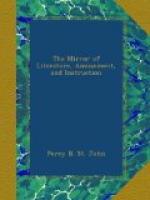When he was in Scotland, Boswell told him that after his death, he intended to erect a memorial to him. Johnson, to whom the very mention of death was unpleasant, replied, “Sir, I hope to see your grand-children.” On his death-bed he observed to the surgeon who was attending him, “I want life, you are afraid of giving me pain.”
It has been supposed that this question had been settled by the authority of Scripture. “Man is born to trouble,” says Job, “as the sparks fly upward.” In turning over a few pages more, we find ourselves in doubt again. “The latter end of Job was more blessed than his beginning; for he had 14,000 sheep, and 6,000 camels, and 1,000 yoke of oxen, and 1,000 she-asses. He had also seven sons and three daughters. So Job died being old and full of days.”
It may not be unpleasant to place before the reader the opinions of several celebrated men, on Life, that he may choose his side, and either like the bee or the spider, extract the poison or gather the honey. We will begin with Sterne, one who well knew the human heart.
“What is the life of
man? is it not to shift from side to side!
from sorrow to sorrow!”
“When I consider how oft we eat the bread of affliction, when one runs over the catalogue of all the cross reckonings and sorrowful items with which the heart of man is overcharged, ’tis wonderful by what hidden resources the mind is enabled to stand it out, and bear itself up, as it does, against the impositions laid upon our nature.”—T. Shandy.
“A man has but a bad bargain of it at the best.”—Chesterfield.
“No scene of human life
but teems with mortal woe.”—Sir
Walter
Scott.
In opposition to these sentiments, Franklin, in writing on the death of a friend, gives us his opinion, “It is a party of pleasure, some take their seats first.”
And Lord Byron, describing Sunrise, in the second canto of Lara, says
“But mighty nature bounds as from
her birth,
The sun is in the heavens, and life on
earth;
Flowers in the valley, splendour in the
beam.
Health on the gale, and freshness in the
stream.
Immortal Man! Behold her glories
shine,
And cry exultingly, ‘They are thine’
Gaze on, while yet thy gladdened eyes
may see,
A morrow comes when they are not for thee.”
In the same spirit Cowper begins his poem on Hope:
“See Nature gay as when she first
began,
With smiles alluring her admirer, man,
She spreads the morning over eastern hills.
Earth glitters with the drops the night
distils.
The sun obedient at her call appears
To fling his glories o’er the robe
she wears,
...
to proclaim
His happiness, her dear, her only aim.”
“The Thracians,” says Cicero, “wept when a child was born, and feasted and made merry when a man went out of the world, and with reason. Show me the man who knows what life is, and dreads death, and I’ll show thee a prisoner who dreads his liberty.”




